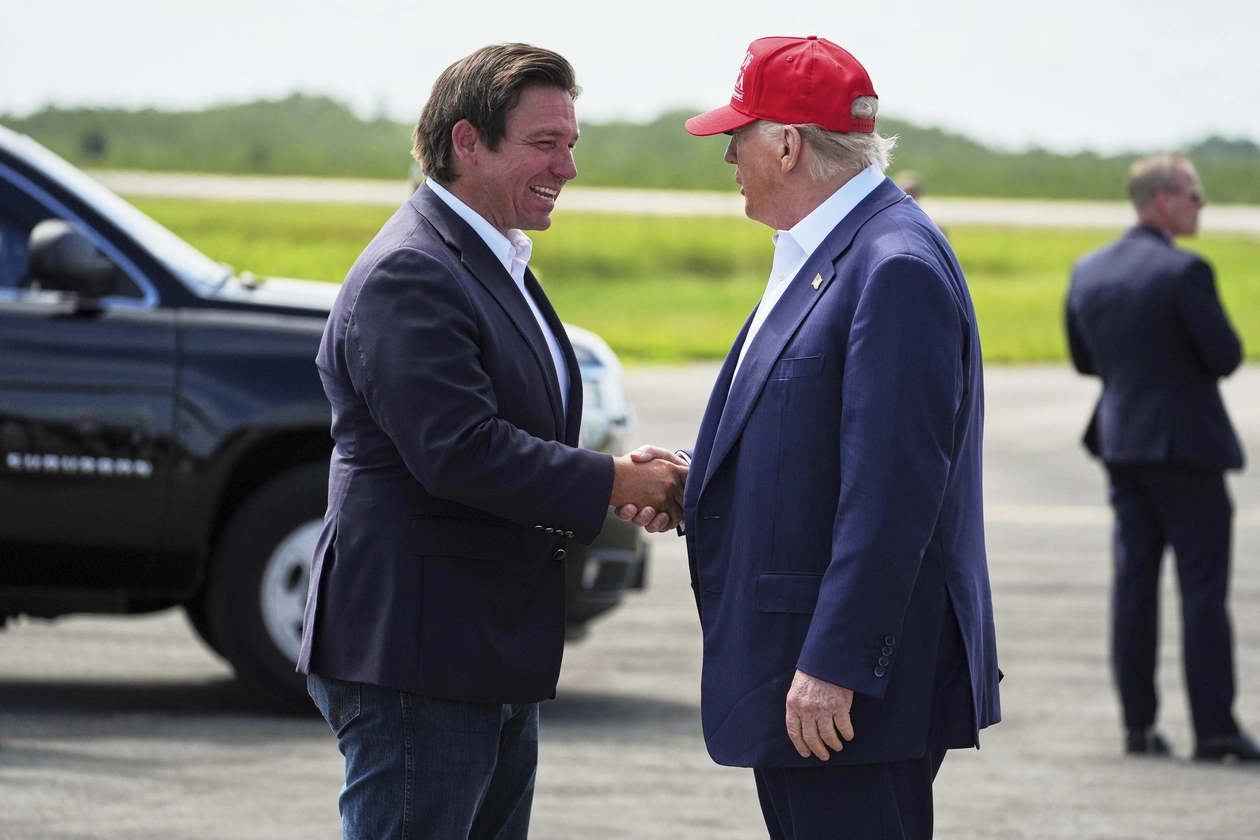Former President Donald Trump and Florida Governor Ron DeSantis united in a striking show of conservative leadership during a high-profile roundtable at the Monroe County Sheriff’s Office Stock Island Detention Center—widely dubbed “Alligator Alcatraz.” The event spotlighted key issues of national security, immigration enforcement, and law-and-order priorities, themes that remain central to conservative political discourse as the 2024 election cycle approaches its apex.
The visit, organized by Monroe County Sheriff Rick Ramsay, began with a comprehensive tour of the 10-acre detention facility. Trump and DeSantis observed firsthand the complexities involved in operating a jail on an island in the Florida Keys, an area known for both its geographical challenges and proximity to frequent maritime incursions by illegal immigrants. With the Biden administration’s border policies continuing to face widespread criticism for their permissiveness and inefficacy, the symbolic location of the event served to underscore Republican opposition to lax federal enforcement.
During the roundtable discussion, Trump reiterated his hardline immigration stance and praised the work of local law enforcement, declaring, “We have to stop people from pouring into our country… and that includes people from parts unknown. Nobody knows where they’re coming from.” He emphasized that under his administration, illegal border crossings had dropped dramatically due to rigorous policy enforcement—a stark contrast to the skyrocketing figures under President Biden’s leadership.
DeSantis, maintaining his consistent pro-security message, highlighted Florida’s state-level efforts to combat federal negligence. “Florida is doing the job that the federal government refuses to do,” he stated, noting the state’s bolstered maritime patrols and expanded law enforcement presence in key coastal entry points. DeSantis has long positioned Florida as a model for state sovereignty and effective governance, particularly when federal agencies fall short—a theme mirrored in his participation alongside Trump.
Sheriff Ramsay, a Republican with decades of law enforcement experience, underscored the daily burdens that come with federal inaction. “We’ve had up to 400 migrants land in a single day,” he explained, citing massive resource strain on local departments. “We need help, and we need leadership that prioritizes border security.” His plea resonated with the conservative ethos of supporting law enforcement and restoring institutional order.
The facility—known for its tough environment and its proximity to waters frequently traversed by Cuban and Haitian vessels—provided a fitting backdrop for the discussion. The nickname “Alligator Alcatraz” is both a nod to its island location and its reputation for rugged enforcement. In a state that often serves as the frontline in immigration-related encounters, it’s no accident that Trump and DeSantis chose this setting to reinforce their shared message.
Though the 2024 GOP primary saw bitter competition between Trump and DeSantis, this joint appearance signals an alignment of purpose against the current administration’s perceived failures. Trump, continuing to dominate in national polling, appears to be consolidating Republican unity with select former rivals, while DeSantis positions himself as a dedicated lieutenant in the broader conservative movement.
Critically, the roundtable exposed a fundamental divide between conservative law-and-order policy and the left’s continued reliance on open-border rhetoric and leniency. Where progressive jurisdictions push sanctuary policies and defund-the-police initiatives, Florida under DeSantis has increased funding for law enforcement and passed legislation directly combating illegal immigration. Trump’s presence at the facility added presidential weight to this strategic divergence, one that voters will soon face head-on.
As both men fielded questions about how federal-state cooperation could be restored under a potential second Trump term, the message was clear: national security must begin at the border, and the states should not be forced to fend for themselves. Trump emphasized the importance of sovereignty and strength, asserting that American law enforcement needs to be empowered—not undermined—by Washington.
Their joint appearance, while brief, sent an unmistakable signal to conservative voters. Unlike the current administration, which has allowed drug traffickers, human smugglers, and foreign nationals to exploit America’s porous borders, Trump and DeSantis remain committed to principles that prioritize citizen safety, legal order, and constitutional authority.
By choosing Alligator Alcatraz as their stage, Trump and DeSantis not only highlighted the failures of progressive border policy but reaffirmed their allegiance to the principles of sovereignty, security, and law enforcement integrity. For conservatives concerned with the erosion of national boundaries and the bureaucratic chaos of the current federal regime, the event offered more than symbolism—it offered a preview of what a restored conservative leadership would look like.

